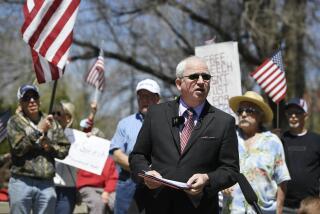Justices Allow Leeway in Interrogations : Judiciary: High court says a suspect’s lawyer need not be present for him to be questioned in unrelated case. Little effect on Miranda rights seen.
- Share via
WASHINGTON — The Supreme Court on Thursday gave police more leeway in questioning a crime suspect without a lawyer being present.
In a 6-3 ruling in a case from Wisconsin, the justices said the Constitution allows a defendant represented by a lawyer to be questioned about an unrelated case without that lawyer being present.
The defendant in the case, Paul McNeil, who was awaiting trial on a robbery charge, agreed to talk to detectives about an unrelated murder investigation without his lawyer present. He eventually signed a confession under a plea agreement and was convicted of murder.
Thursday’s decision coincided with the 25th anniversary of the landmark Miranda vs. Arizona ruling, in which the Supreme Court said that police officers must warn suspects of their right to remain silent and to have a lawyer.
Under the Miranda ruling, which grew out of the Fifth Amendment, police officers may not question suspects on any matter once they have asked for a lawyer. And, under the Sixth Amendment, policemen may not question defendants about the alleged crime once they have been arraigned and given a lawyer.
Attorneys for McNeil said the Fifth and Sixth Amendment rights should be combined to forbid police questioning on any matter once a defendant is assigned a lawyer. The court’s conservative majority disagreed, although the justices predicted that their decision would not have a broad impact on the Miranda rule.
“Since the ready ability to obtain uncoerced confessions is not an evil, but an unmitigated good, society would be the loser” if all voluntary confessions were invalidated simply because a suspect had spoken to an attorney, Justice Antonin Scalia said.
A defendant has a right to an attorney once he has been charged with a crime, but that attorney does not automatically represent the suspect on other matters under investigation, Scalia said in the case (McNeil vs. Wisconsin, 90-5319).
Justice John Paul Stevens, in a dissenting opinion, predicted that the ruling would have little impact on police interrogations, but he said: “As a symbolic matter, today’s decision is ominous because it reflects a preference for an inquisitorial system that regards the defense lawyer as an impediment rather than a servant to the cause of justice.”
McNeil was arrested in Omaha in May, 1987, on an armed robbery charge. When he was informed of his Miranda rights, he refused to answer questions and did not ask for a lawyer. When he was returned to Milwaukee for arraignment, he was assigned a lawyer.
Meanwhile, police in the Racine, Wis., area suspected that McNeil had been involved in an unrelated murder and armed robbery. When detectives visited him in jail, he waived his Miranda rights, including the right to have a lawyer present, and confessed to the murder.
McNeil pleaded guilty to murder and was sentenced to 60 years in prison. In the appeal to the Supreme Court, he contended that police should not be permitted to go behind the back of his lawyer and question him on other matters.
More to Read
Sign up for Essential California
The most important California stories and recommendations in your inbox every morning.
You may occasionally receive promotional content from the Los Angeles Times.














